Accessible Villas: Catering to Mobility and Special-Needs Travelers
Understanding the Needs of Mobility and Special-Needs Travelers
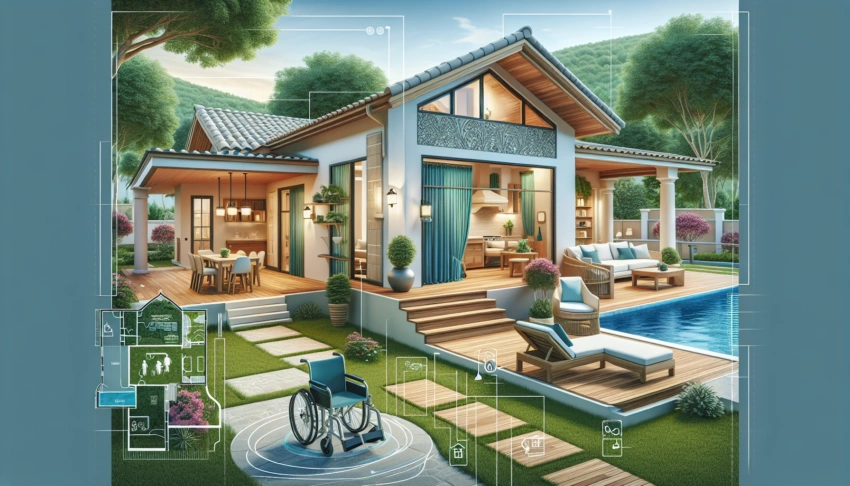
Accessible Villas: Catering to Mobility and Special-Needs Travelers
Traveling should be an enriching experience for everyone, yet for those with mobility and special needs, it can often present unique challenges that require thoughtful consideration and planning.
1. Identifying Mobility Challenges
Individuals with mobility challenges face a variety of obstacles that can impact their travel experiences. Common issues include difficulty with stairs, narrow doorways, and uneven surfaces. For travelers reliant on wheelchairs or mobility scooters, finding accommodations that provide easy access can be a daunting task.
To address these challenges, accommodations must offer features such as ramps, elevators, and wide doorways. These elements not only facilitate movement but also ensure the safety and comfort of travelers. Additionally, providing accessible transportation options from airports and train stations can significantly improve the travel experience for those with mobility impairments.
2. Special Needs Considerations
Travelers with special needs encompass a broad spectrum, including sensory and cognitive challenges. For instance, individuals with sensory processing disorders may require accommodations that minimize sensory overload, such as quieter environments or reduced lighting. Cognitive impairments, on the other hand, may necessitate clear signage and easy-to-navigate spaces to prevent confusion and anxiety.
Accommodations catering to these travelers must consider these unique requirements and offer tailored solutions. This could range from providing sensory-friendly rooms to offering staff trained in handling emergencies specific to cognitive challenges.
3. Importance of Accessibility in Travel
Accessibility in travel is not merely a matter of convenience; it is essential for ensuring equality and enhancing the quality of life for travelers with mobility and special needs. An accessible environment allows individuals to travel with dignity and independence, opening up opportunities to explore the world without limitations.
When accommodations prioritize accessibility, it not only benefits those with special needs but also enhances the overall guest experience. By fostering an inclusive environment, accommodations can tap into a broader market and demonstrate a commitment to diversity and equality.
In conclusion, understanding and addressing the needs of mobility and special-needs travelers is crucial for creating inclusive travel experiences. By prioritizing accessibility, we can break down barriers and allow everyone to enjoy the adventures the world has to offer.
Features of Accessible Villas
Accessible villas are more than just luxurious abodes; they are sanctuaries tailored to meet the diverse needs of travelers with mobility and special needs. By integrating thoughtful design elements and innovative technologies, these villas ensure comfort and independence for all guests.
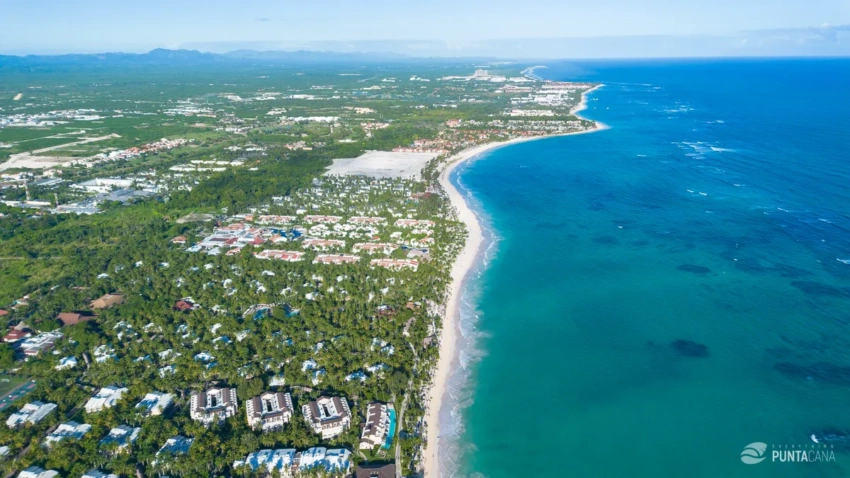
Punta Cana, drone view
1. Structural Accessibility
Structural accessibility is the backbone of any accessible villa. It encompasses the architectural elements that ensure ease of movement and convenience for individuals with mobility challenges. Key features include:
- Ramps and Elevators: These are essential for providing wheelchair users with easy access across different levels of the villa. Ramps should have a gentle slope, while elevators should be spacious enough to accommodate wheelchairs.
- Wide Doorways: Standard doorways are often too narrow for wheelchairs. Accessible villas ensure doorways are at least 32 inches wide to allow smooth passage.
- Non-Slip Flooring: Floors should be made from materials that reduce slip risks, ensuring safety for individuals with balance issues.
2. Adaptive Living Spaces
Adaptive living spaces are crucial for ensuring that every area of the villa is usable and comfortable for guests with special needs. This involves thoughtful design and modifications that cater to various requirements:
- Accessible Bathrooms: These are equipped with grab bars, roll-in showers, and lower sinks to accommodate wheelchair users. Shower chairs and handheld showerheads further enhance convenience.
- Kitchens Tailored for Accessibility: Countertops and sinks at lower heights, pull-out cabinets, and easy-to-reach appliances are essential for creating a functional and inclusive kitchen space.
- Flexible Furniture Arrangements: Moveable and adjustable furniture allows for customization according to the specific needs of the guests.
3. Technology and Smart Home Features
Technology plays a transformative role in enhancing the accessibility of villas. By incorporating smart home features, villas can significantly improve the quality of life for travelers with special needs:
- Voice-Activated Systems: These systems allow guests to control lights, thermostats, and entertainment devices without needing to physically interact with them, providing greater independence.
- Specialized Apps: Apps designed to assist with navigation and communication can be pre-installed on devices provided in the villa, offering personalized assistance at the touch of a button.
- Emergency Alert Systems: Integrated systems that can alert caregivers or medical services in case of emergencies are critical for safety.
Our Best Accessible Villas in Punta Cana
Experience the ultimate in comfort and luxury with our range of accessible villas. Each property is meticulously designed to cater to the unique needs of mobility and special-needs travelers, ensuring an unforgettable stay.

Exclusive Ocean View 5-Star Cap Cana Villa for Rent - Chef, Butler, Maid & Golf Cart
from $4600 night Read more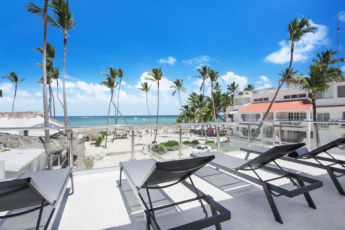
Luxury Villa Right on Los Corales Beach - With Heated Pool, Maid & Chef in Bávaro
from $2995 night Read moreIncorporating these features not only makes a villa more accessible but also enhances the overall experience for all guests, promoting inclusivity and independence. The thoughtful design and innovative technology ensure that everyone can enjoy the beauty and comfort of Punta Cana.
Choosing the Right Accessible Villa
Selecting the ideal accessible villa is crucial for ensuring a comfortable and enriching experience for travelers with mobility and special needs. The right choice can significantly enhance the quality of the trip, making it not just feasible but truly enjoyable.
1. Evaluating Location and Surroundings
Choosing an accessible villa goes beyond the physical features of the property itself. The location and surroundings play a pivotal role in determining the convenience and enjoyment of the stay.
Proximity to healthcare facilities is a key consideration, especially for travelers who may require medical attention or ongoing treatments. It’s advisable to select villas close to hospitals or clinics with accessible services. Additionally, being near accessible attractions and activities can greatly enhance the travel experience. This includes beaches with wheelchair ramps, museums with audio guides, and parks with accessible trails.
When evaluating the surroundings, consider the terrain and landscape. Villas located on steep hills or in areas without paved roads can pose significant challenges. Ensure the area is navigable and safe for those with mobility aids.
Factors to Consider When Evaluating Villa Location
| Factor | Consideration | Example |
|---|---|---|
| Healthcare Proximity | Distance to nearest accessible medical facility | Within 5 miles of an accessible hospital |
| Accessible Attractions | Nearby attractions with accessibility features | Wheelchair-friendly beaches, museums with audio guides |
| Terrain and Landscape | Ease of navigation in the surrounding area | Flat terrain, paved roads |
| Public Transport Access | Availability of accessible public transportation | Bus stops with wheelchair ramps |
2. Assessing Villa Amenities
When it comes to villa amenities, the focus should be on comfort and functionality for all guests. Begin by ensuring that the villa has basic accessibility features like step-free entrances, wide doorways, and accessible bathrooms. These features are non-negotiable for mobility and special-needs travelers.
The availability of adaptive equipment such as shower chairs, grab bars, and adjustable beds can make a significant difference in the comfort of the stay. It’s also important to check for sensory-friendly amenities, such as soundproof rooms or adjustable lighting, for those with sensory sensitivities.
Furthermore, consider the availability of technology that can aid accessibility. Voice-activated systems, smart home controls, and specialized apps can enhance independence and convenience.
3. Reading and Understanding Accessibility Certifications
Accessibility certifications serve as a seal of assurance that a property meets specific standards of accessibility. These certifications are critical in helping travelers make informed decisions and ensuring that their needs will be adequately met.
Understanding these certifications involves recognizing what each one signifies. For example, the ADA (Americans with Disabilities Act) compliance indicates adherence to federal standards for accessible design in the United States. Other certifications, like the Global Sustainable Tourism Council’s accessibility guidelines, may also highlight eco-friendly and sustainable practices in the context of accessibility.
To effectively interpret these certifications, one should look for detailed descriptions of the accessibility features covered, ensuring they align with personal or group-specific needs. If in doubt, reaching out to the villa management for clarification can provide additional peace of mind and ensure there are no surprises upon arrival.
Our selection of accessible villas in Punta Cana is designed with your comfort and needs in mind. Each villa has been carefully assessed to meet the highest standards, ensuring you have a memorable and hassle-free stay.
Our Best Accessible Villas in Punta Cana
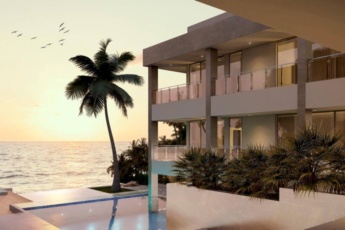
Brand-New Oceanfront Luxury Cap Cana 10BR Villa - Private Beach, Full Staff, Home Theater
from $8648 night Read more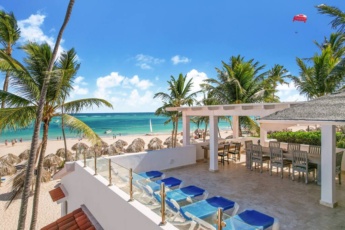
New Bávaro Beach Beachfront Condo for Rent - Stunning Ocean View, Housekeeper & Rooftop Terrace
from $811 night Read moreBooking and Planning for an Accessible Stay
Navigating the process of booking and planning a stay in an accessible villa requires a proactive approach, ensuring that all needs are met for a seamless and enjoyable experience. This section provides crucial insights into how to effectively convey requirements and prepare for a smooth journey.
1. Communicating Needs Clearly
The cornerstone of a successful accessible stay lies in clear communication with villa owners or managers. Ensuring that your specific needs are understood and accommodated can significantly enhance your travel experience.
- Start by crafting a detailed list of your accessibility requirements, considering both mobility and any special needs. This list should include physical accommodations such as wheelchair access, as well as any necessary sensory or cognitive supports.
- Reach out to the villa management well in advance of your stay. Use multiple channels of communication—email, phone calls, or even video calls—to ensure that your message is received and understood.
- Ask for confirmation in writing that the villa can meet your specific needs. This step is vital to avoid any last-minute surprises and holds the property accountable for providing suitable accommodations.
- Consider using a translator if language barriers exist. Misunderstandings can be minimized by ensuring that both parties are on the same page regarding accessibility requirements.
Our Best Accessible Villas in Punta Cana
Explore our curated selection of accessible villas in Punta Cana, each designed to cater to various mobility and special needs. These properties ensure a comfortable stay with all necessary accommodations.
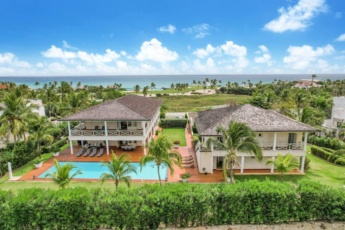
Private Cap Cana Caleton Villa with Large Pool, Ocean View, and Top Amenities
from $2246 night Read more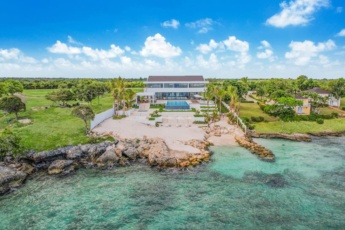
New & Luxury Casa de Campo Oceanfront Villa - With Private Beach, Large Pool, Top Amenities
from $14820 night Read more2. Understanding Policies and Services
Before finalizing a booking, it is essential to thoroughly understand the policies and services offered by the villa, ensuring that they align with your accessibility needs.
- Inquire about accessibility-specific policies such as cancellation terms, especially if they relate to unforeseen accessibility issues.
- Ask about the availability of on-site staff to assist with accessibility needs. Some villas may offer concierge services or have staff trained in assisting guests with special requirements.
- Investigate the villa’s proximity to necessary services such as medical facilities or pharmacies. This is crucial for guests who might require medical attention or supplies during their stay.
- Understand the villa’s service offerings, including transportation arrangements. Some properties may offer shuttle services or accessible vehicle rentals, which can greatly enhance mobility and convenience.
3. Pre-Trip Preparations
Preparation is key to ensuring a trouble-free and enjoyable accessible stay. Creating a comprehensive pre-trip checklist can help manage potential challenges and enhance your travel experience.
- Pack smart: Ensure that you bring all necessary mobility aids, medications, and comfort items. Consider any special equipment you might need, such as portable ramps or shower chairs, and check whether the villa can provide these.
- Investigate travel insurance options that cover accessibility needs. This can provide peace of mind in case of disruptions or emergencies.
- Organize transportation arrangements in advance, ensuring that any vehicles are equipped for your needs. Confirm all bookings to avoid last-minute issues.
- Prepare a travel itinerary that includes accessible attractions and activities. This can help maximize your experience while minimizing stress and unexpected challenges.
By following these guidelines, travelers can ensure a well-planned and enjoyable stay in an accessible villa, paving the way for a memorable experience in beautiful Punta Cana.
Innovations in Accessible Villa Design
As the demand for inclusive vacation options grows, the hospitality industry is witnessing a transformative shift in how villas are designed for accessibility. These innovations are not only enhancing the travel experience for individuals with mobility and special needs but are also setting new standards in the luxury accommodation sector.
1. Sustainable and Accessible Design
In an era where environmental consciousness is paramount, blending sustainability with accessibility is a forward-thinking approach. Villas are increasingly being designed with eco-friendly materials that are also functional for travelers with mobility challenges. For instance, sustainable bamboo flooring offers a non-slip surface, reducing the risk of falls. Additionally, solar-powered elevators are being incorporated as a sustainable alternative to traditional lifts, ensuring energy efficiency while maintaining essential accessibility.
Key Elements of Sustainable Accessible Villas
| Sustainable Feature | Accessibility Benefit | Environmental Impact |
|---|---|---|
| Bamboo Flooring | Non-slip and easy to clean | Rapidly renewable resource |
| Solar-Powered Elevators | Energy-efficient vertical mobility | Reduces carbon footprint |
| LED Lighting | Improved visibility | Long-lasting and energy-saving |
2. Customizable Spaces for Diverse Needs
One of the most exciting trends in villa design is the creation of customizable spaces that cater to a wide range of accessibility needs. These spaces can be adjusted according to the specific requirements of the guest. For example, adjustable-height kitchen counters and sinks make it easier for individuals using wheelchairs to access amenities. Similarly, modular furniture can be rearranged to create more space for mobility aids or to adapt the layout to suit sensory and cognitive needs.
The integration of technology in these customizable spaces is also noteworthy. Smart home systems allow guests to control lighting, temperature, and entertainment through voice commands or mobile apps, providing a seamless and intuitive experience.
3. Future Technologies in Accessible Travel
The future of accessible villa design is being shaped by cutting-edge technologies that promise to revolutionize the travel experience for those with mobility and special needs. One such innovation is the use of virtual reality (VR) to offer virtual tours of villas, enabling potential guests to explore the space before booking. This ensures that their specific accessibility requirements are met, thus facilitating informed decision-making.
Moreover, the development of robotic assistance devices is gaining traction. These devices can perform a range of tasks, from carrying luggage to providing personal care assistance, thereby offering unparalleled convenience and autonomy to guests.
As these technologies continue to evolve, they hold the potential to make travel more inclusive and accessible than ever before, breaking down barriers and opening up new possibilities for adventure and exploration.
Frequently Asked Questions
What features should an accessible villa have for mobility-impaired travelers?
An accessible villa should include features such as ramp access to the entrance, wide doorways to accommodate wheelchairs, roll-in showers, grab bars in bathrooms, and a bedroom on the ground floor. Additionally, it should have a layout that allows easy maneuverability for those using mobility aids.
How can I verify if a villa is truly accessible before booking?
Contact the villa owner or management directly to ask specific questions about accessibility features. Request photos of the amenities and, if possible, reviews from previous guests with similar needs. It’s also beneficial to look for villas that have been certified by accessibility organizations.
Are there any online platforms that specialize in accessible villa rentals?
Yes, there are platforms specifically catering to accessible accommodations, such as Accomable, which focuses on properties with verified accessibility features. Other mainstream platforms like Airbnb and VRBO also allow you to filter for accessible-friendly properties.
What should I consider when traveling with someone who has special needs?
Consider the specific needs of the individual, such as medical equipment, dietary requirements, and any assistance they may need for daily activities. Ensure the villa meets these needs and that local medical facilities are accessible in case of emergencies.
Can I request additional accessibility equipment at a villa?
Many villas can arrange for additional equipment like shower chairs or portable ramps. It’s best to inquire well in advance to ensure availability and that there may be additional charges for these services.
Are pet-friendly accessible villas available for travelers with service animals?
Yes, many accessible villas are pet-friendly and accommodate service animals. Always confirm this with the property owner or manager beforehand to understand any specific rules or requirements.
Is there any extra cost associated with booking an accessible villa?
While some accessible villas may charge higher rates due to specialized features, many do not have additional costs compared to standard accommodations. Always compare prices and check if accessibility features are included in the rental rate.
What should I do if I encounter an accessibility issue after arriving at the villa?
Contact the property manager or owner immediately to address the issue. Document the problem with photos and detailed notes. If the issue is not resolved satisfactorily, consider reaching out to the booking platform for support.
